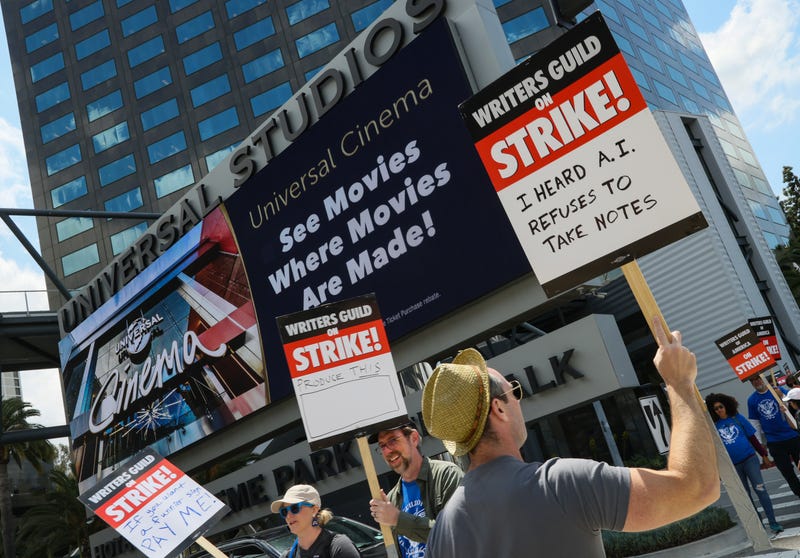
LOS ANGELES (CNS) - With negotiations stalled, negotiators for the striking Writers Guild of America suggested Friday that they could more easily reach new contracts with individual Hollywood studios if they broke ranks with the Alliance of Motion Picture and Television Producers that is leading labor talks for the industry.
In a message to WGA members, the union's negotiating team noted that traditional studios have "disparate business models and interests" compared to streaming companies such as Netflix. But since studios and streamers are both relying on the AMPTP to lead the negotiations, it "allows hard liners to dictate the course of action for all the companies."
"The AMPTP purports to represent all of these disparate corporate interests, but in practice administers a system that favors inflexibility over compromise, and sacrifices the interests of individual companies in reaching a deal. That regression to the hardest line has produced the first simultaneous strikes since 1960," negotiators wrote, referring to the companion strike by the SAG-AFTRA actors' union.
WGA negotiators said they have had conversations with individual executives from traditional studios who have expressed a willingness to negotiate terms and even meet some union demands. But since the AMPTP also represents streamers, which are competitors to studios, and negotiates on behalf of all the companies together, there has been no interest by the alliance to budge on some union proposals.
"So, while the intransigence of the AMPTP structure is impeding progress, these behind-the-scenes conversations demonstrate there is a fair deal to be made that addresses our issues," according to the WGA negotiating team. "... We have made it clear that we will negotiate with one or more of the major studios, outside the confines of the AMPTP, to establish the new WGA deal. There is no requirement that the companies negotiate through the AMPTP. So, if the economic destabilization of their own companies isn't enough to cause a studio or two or three to either assert their own self-interest inside the AMPTP, or to break away from the broken AMPTP model, perhaps Wall Street will finally make them do it."
The negotiators added that "the companies inside the AMPTP who want a fair deal with writers must take control of the AMPTP process itself, or decide to make a deal separately. At that point, a resolution to the strike will be in reach."
There was no immediate response from the AMPTP.
The WGA has been on strike for about 130 days. Negotiators for the union met with AMPTP negotiators last month to no avail. Union leaders sent a message to WGA members two weeks ago saying the studios' latest contract offer made some concessions, but not "nearly enough."
The union also accused the AMPTP of trying to sow discord among union members by publicly releasing details of its offer. Union officials said the latest AMPTP offer included some salary boosts, "but only for a statistically tiny category of screenwriters, excluding all but the first writers of original screenplays."
The offer also included a guarantee of minimum writing staff size for television, "but the loopholes, limitations and omissions in their modest proposal ... make them effectively toothless," according to the union.
WGA negotiators also said there was movement by the studios on protections against the use of artificial intelligence, "but we are not yet where we need to be. As one example, they continue to refuse to regulate the use of our work to train AI to write new content for a motion picture."
The studios also made a concession by "offering to allow six WGA staff to study limited streaming viewership data for the next three years," but a viewership-based compensation package would have to wait until the next contract negotiations in three years, according to the union. "In the meantime, no writer can be told by the WGA about how well their project is doing, much less receive a residual based on that data," according to the WGA negotiators.
AMPTP officials issued a statement after last month's union meeting, professing to be focused on resolving the strike and touting the benefits of the alliance's counter-offer to union proposals.
"The offer recognizes the foundational role writers play in the industry and underscores the companies' commitment to ending the strike," according to the statement from AMPTP.
According to the AMPTP, the studios' offer includes the largest pay bump for the WGA in 35 years, with an increase of 5% in the first year, along with bumps of 4% and 3.5% in the following two years.
The WGA had sought a 6% increase to minimums and residual bases in the first year, followed by 5% increases in the second and third years, according to the Los Angeles Times.
The studio offer also includes increased authority for showrunners to determine staffing in the writing room, along with extensive protections for writers against the use of artificial intelligence and increases in residuals for streaming programs, according to the AMPTP. The studios have also agreed to provide details on streaming viewership numbers, with the union pushing to tie compensation to those figures.
"Our priority is to end the strike so that valued members of the creative community can return to what they do best and to end the hardships that so many people and businesses that service the industry are experiencing," AMPTP President Carol Lombardini said in a statement.
The studios have generally said they want the WGA and SAG-AFTRA to agree to similar terms already approved by the Directors Guild of America, which includes a roughly 12.5% salary increase and an estimated 21% jump in streaming residuals, along with assurances that artificial intelligence will not supplant the duties of human beings.
Listen and subscribe to The L.A. Local podcast: your TL;DR for what's happening in Southern California
Follow KNX News 97.1 FM
Twitter | Facebook | Instagram | TikTok
